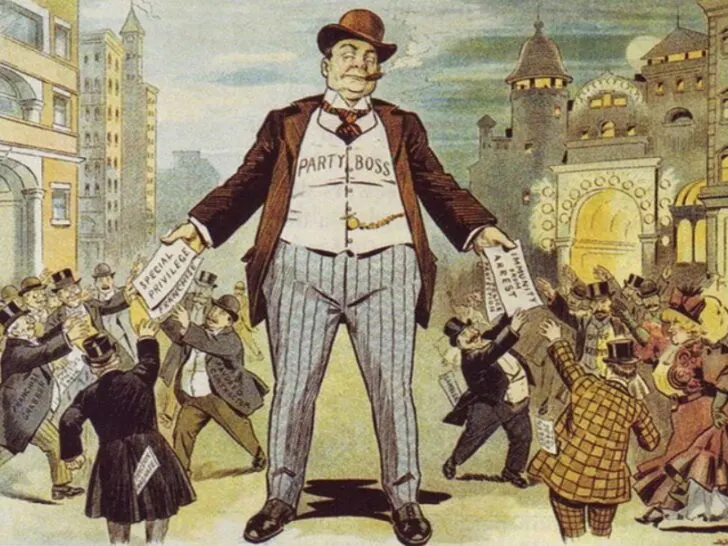A “party boss” is a high-ranking individual within a political party, typically at the state or local level, who wields significant influence over party operations, candidate selections, and often even the legislative agenda.
The reach of a party boss can extend into a variety of political activities, from fundraising to the articulation of party doctrine.
Though it is tempting to equate the role of a party boss merely to organizational leadership, the scope is far more intricate and consequential.
Origin of “Party Boss”
Party bosses historically exert control not just through their formal positions but also through intricate networks of patronage and sometimes even corruption.
These are individuals who can make or break political careers, often doing so behind the scenes, away from the scrutiny of party rank-and-file or the public.
In periods like the late 19th and early 20th centuries, party bosses such as Tammany Hall’s Boss Tweed in New York City gained almost legendary status for their ability to manipulate the machinery of politics.
They determined who ran for office, what policies were prioritized, and which party members received the spoils of victory.
Often, their influence was not restricted to the political arena; it pervaded local economies, media landscapes, and social institutions.

Role of the “Party Boss”
One crucial function of a party boss has been the selection of candidates.
They’re the kingmakers, identifying and grooming individuals for office who will uphold the party line and remain loyal to the party’s power structure.
It is a role imbued with a pragmatic, often ruthless, calculation aimed at electoral success rather than ideological purity.
Hence, the chosen candidates are often those believed to be most electable rather than most representative of party ideology.
The modus operandi of party bosses has evolved over the years, particularly with the advent of primaries, campaign finance laws, and greater media scrutiny.
The smoke-filled rooms where deals were once made have largely been replaced by more sophisticated methods of influence, such as Political Action Committees, Super PACs, and digital grassroots mobilization.
Despite these changes, the underlying dynamic remains: a concentration of power in the hands of a few, aimed at shaping the political landscape to serve specific interests, often under the guise of party unity or electoral viability.
The positive case for a “Party Boss”
While the term “party boss” often carries a pejorative undertone due to its association with political machines and corruption, it’s important to note that their influence can also be stabilizing.
Party bosses can act as arbiters in intra-party disputes, ensuring that factions coalesce around shared objectives.
They can ensure the allocation of resources where they are most needed, whether it’s a high-stakes congressional race or a local council election.
And in an era where party polarization is often lamented, they can facilitate dialogue and compromise, as they tend to place a premium on electoral victory over ideological rigidity.
Do “Party Bosses” still exist?
The New York Times portrayed Donald Trump as a modern day party boss:
Inspiring fear, hoarding cash, doling out favors and seeking to crush rivals, Mr. Trump is behaving not merely as a power broker but as something closer to the head of a 19th-century political machine.
Use of “Party Boss” in a sentence
- The party boss, keenly aware of the electoral landscape, decided to allocate the majority of campaign resources to swing districts, demonstrating the strategic acumen that had kept him in power for years.
- Despite her progressive leanings, the candidate found herself having to court the party boss, whose influence could single-handedly secure her the nomination.
- The rise of grassroots movements and decentralized fundraising platforms has diminished the once-unquestioned authority of party bosses, forcing them to adapt to a new political environment where power is less centralized.